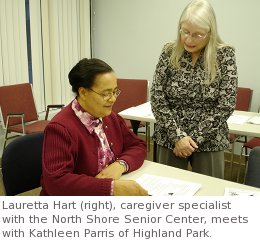No matter what their health circumstances, older adults will never choose to leave the comfort and familiarity of their home and move to an assisted living or nursing care community.
It’s a given that they want to stay in their own home as long as possible.
Historically, the caregiver role has been undertaken by family members. And although many still serve as caregivers, our culture has shifted to extended families unable to assist. Fortunately, people in the Chicago area, and the northern suburbs in particular, have lots of options and support services to help older family members.
“I’ve never met an older adult who wishes to move,” said Lauretta Hart, caregiver specialist in the Evanston office of the North Shore Senior Center.
Because the caregiving role can be very stressful and lonely, the Center offers monthly caregiver support group meetings for spouses and partners.
 “People meet to talk about what they are going through,” said Lauretta. “They share their personal experiences and openly discuss their own difficulties in a non-judgmental atmosphere.”
“People meet to talk about what they are going through,” said Lauretta. “They share their personal experiences and openly discuss their own difficulties in a non-judgmental atmosphere.”
Evaluate Your Needs
There are options when seeking help at home. First, assess your needs as a caregiver and the needs of the person you are caring for. The Family Caregivers Alliance recommends you consider the following:
- Personal Care: bathing, eating, dressing, toileting
- Household Care: cooking, cleaning, laundry, shopping
- Health Care: companionship, meaningful activities, conversation
Experts agree that a comprehensive assessment should be conducted in the home, preferably by a geriatric care manager. And, you should work with an agency that is licensed by the State of Illinois, bonded and insured. Always remember to check references and certifications.
Work Only With a Reliable Agency
“Screen the agency for licensure and ask questions about their hiring practices,” advises Mary Roman, manager of social services at Mather Pavilion in Evanston. “It’s important to look for an agency with a solid reputation and one that follows the care management protocol.”
A care manager will help you determine if alternative, and less expensive, services are possible. For example, adult day care, friendly visiting services, home grocery delivery, pharmacy delivery and meals on wheels programs might be sufficient.
“Every family situation is unique,” says Bob Caldwell, president of NorthShore FamilyCare. “Because of the service we provide we do become part of the extended part of the family so, compatibility is very important.”
There are excellent resources available to help make your caregiver decision. Presbyterian Homes recommends Family Caregiver Alliance and the National Center on Caregiving, to families who are seeking in-home care. The North Shore Senior Center provides publications and services for older adults and their caregivers.

